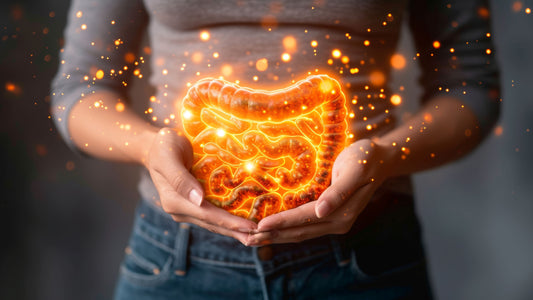Why am I so hungry all the time? It’s often a frustrating reality of menopause. For many women, it seems your hunger goes up, and the amount of food it takes to make you feel full increases. You feel like snacking at night, and you just can’t seem to stop the food noise, cravings, or weight gain.
Luckily, there are reasons your hunger levels and satiety are changing during menopause. Which means, if we know why it’s happening, there are solutions to the problem!
In this article, we’ll explore:
Does menopause make you hungry?
5 big reasons behind the constant hunger.
How to design a diet that keeps you feeling full, satisfied, and way less hungry
Easy habits that help stop the food noise

Why Am I Constantly Hungry During Menopause?
Menopause hunger isn’t in your imagination, Girlfriend.
A lot of women report that hunger during menopause increases significantly. While we don’t have a mountain of evidence to back up this claim, a study of women over the course of 5 years showed they got hungrier during the menopause transition — and they experienced increased food noise and thoughts about eating more food. (1)
After working with tens of thousands of women over the years, I can anecdotally say that many experience an increase in hunger during menopause.
In menopause, increased hunger often leads to weight gain. Which in turn leads to an increased risk of all sorts of negative health outcomes, from heart disease to diabetes.
So, why does this happen? Why does menopause and perimenopause hunger plague women?
Let’s take a look.

1. Your Hunger Hormones Are Conspiring Against You
What does it mean when you’re always hungry? Well, it likely means your hunger regulation hormones are out of balance.
There are two main hormones involved in hunger regulation:
- Leptin — tells the brain you’re full
Ghrelin — communicates hunger to the brain
In menopause, leptin and ghrelin can become out of sync. With all of your other hormones (like estrogen, testosterone, and follicle-stimulating hormone) fluctuating during this time, leptin and ghrelin get their roles a bit confused. (2)
The result?
You could feel hungrier, and what you eat makes you feel less full than you normally would.
Ugh.

2. Your Sleep Is Disrupted
In menopause, sleep quality often declines. And that can, unfortunately, lead to more hunger.
When you aren’t sleeping well, it’s often tied to a decrease in progesterone that can start in perimenopause (which for some women, means in your mid to late 30s!). When progesterone starts to dip, estrogen and androgens can take over the show — and you’ll find you’ve got some racing thoughts before bed, anxiety, and poor-quality sleep that can also be exacerbated by night sweats and hot flashes. Cue the sleepless nights, difficulty falling asleep, and waking up much earlier than you intended.
When you aren’t sleeping properly, your leptin and ghrelin levels can be thrown off. In fact, there was a study done where they evaluated over 1,000 volunteers for sleep duration and quality. Unsurprisingly, the people who had the least amount of sleep had reduced leptin levels and elevated ghrelin. Yep, sleep deprivation kicked off the production of hormones that make you feel hungrier and less satisfied! (3)
This is one of the reasons why I always say a good night’s sleep is non-negotiable.
If you’re struggling with sleep, supplementing with high-quality magnesium l-threonate like my Better Brain & Sleep formula can help.

3. Your Cortisol’s Out Of Control
Cortisol is one of your body’s stress response hormones. And cortisol tends to rise with age. (4)
Cortisol is tricky because you don’t want to get rid of it altogether. It’s a crucial hormone for your immune system and your sleep-wake cycle. And if you really are in danger, you need that rush of cortisol to help you get out of a bad situation.
The relationship between menopause and cortisol is fraught with complications. That’s because if you’re in menopause and your sex hormone levels are fluctuating, and you’re under daily stress (and said stress seems multiplied by your current hormone imbalances) you can have more cortisol circulating in your body than is ideal.
This leads to a couple of problems:
1. Your progesterone declines even further
When your adrenals focus on cortisol production, they aren’t focusing on sex hormone production, notably Dehydroepiandrosterone (DHEA), which is synthesized into progesterone, the calming hormone. That leads to more complications with sleep, hot flashes, anxiety, all of it. Which in turn leads to increased hunger hormones, as we discussed above.
2. Cortisol is a fat-storage hormone that makes you crave food.
Yes, elevated cortisol makes you hungrier. (5) Think about it. When your body is under stress, it releases cortisol which is intended to be a quick solution to a dangerous problem. From there, your body recognizes it needs a burst of energy, which it gets by metabolizing food, right? When you metabolize food, your body looks for more food…which creates hunger and cravings. And, the cravings aren’t for green veggies, they’re for quick energy foods like sugar and carbs.
The number one thing you can do to calm your adrenals and get a hold on excess cortisol is to eat a healthy, balanced diet and add adaptogens into your life. My Mighty Maca® drink mix is packed with stress-busting adaptogens and a ton of superfoods to help you feel your best during menopause.

4. Your Blood Sugar Is Dysregulated
When your appetite is out of control, it’s usually a good sign that your blood sugar is out of balance. This is what we call insulin resistance, and it often increases during menopause.
When you eat, your body turns food into glucose. From there, glucose gets distributed to each of your cells to give them energy. Insulin helps facilitate glucose getting into the cells.
If you have insulin resistance, glucose can’t get into the cells to give them the energy they need. Instead, insulin tells glucose to turn around and go back into the bloodstream.
The real tragedy here is that then, your cells are left feeling like they need more energy. So they send hunger cues to your brain asking for more food. It’s a frustrating cycle that leads to weight gain and eventually, diabetes.
If your blood sugar isn’t properly controlled, the best thing you can do is to change your diet.
Let’s take a look at how best to do that.

5. Your Diet Isn’t Dialed In
If you find yourself asking “Why am I so hungry sometimes?” the answer lies in a combination of all the things we’ve discussed so far:
Your hunger and sex hormones
Cortisol levels
Sleep
Blood sugar
And there’s one thing that can help you support ALL of these factors at once: your diet.
If you’re feeling hungry all the time, it’s very likely your diet isn’t properly designed.
First off, if you feel hungry all the time, you’ve got to make sure you’re eating enough. We’ve been conditioned by diet culture over the years to simply start “eating less” which we’ve translated into “trying to starve yourself.” When you’re eating way less than you need, it can lead to nutrient deficiencies (which make you feel hungrier), eating disorders, and it can increase cortisol, which increases hunger and cravings.
Plus, when you’re significantly under-fueling your body, it can make you dive straight into a bag of potato chips the minute your willpower wanes — sending your blood sugar into a tailspin and causing the whole situation to get even worse.
How To Stop Food Noise With Proper Diet
As I explained earlier, when your blood sugar is out of balance, it makes your body feel like it’s starving. Your cells can’t get the nutrients they need, because insulin resistance is preventing glucose from entering them. So they’re crying out for help.
This is what’s at the root of food noise, or those regular thoughts about food that plague you. It’s also why many people report that semaglutide and other glucagon-like peptide 1 (GLP-1) agonists help reduce food noise. When you improve the blood sugar issues, it helps silence those hungry voices in your body.
If you’re feeling hungry all the time, and you want to stop food noise naturally and without medication, Instead of trying to just eat less, ideally, your diet should be designed to balance your blood sugar by including with each and every meal:
Ample healthy fats (olive oil, avocados, MCT oil)
Plenty of protein (salmon, chicken, eggs)
Lots of fiber (from an abundance of green vegetables)
When you create your diet with these building blocks, you automatically help support your blood sugar, adrenal health, sleep, and blood sugar. Which is great at any stage of life, but especially during perimenopause and menopause.

Resistance Training
Weight lifting and bodyweight resistance training helps build muscle, and muscle uses a lot of glucose. So the more muscle you build, the better your blood sugar becomes. (9)

Walk After Meals
Studies indicate that walking for even a few minutes after meals can help improve blood sugar. (10) Sure, longer, more intense walks are better, but if you can’t fit in more than a few minutes, it can help!

Try Intermittent Fasting
I’ve been an advocate of intermittent fasting (IF), also known as time restricted eating for years. And it’s not as difficult as it sounds. Just have your last bit of food no later than 6-7 PM at night, have a cup of unsweetened tea or black coffee in the morning, and eat breakfast a little later, after 9-10 AM. This gives your body a chance to properly digest your food, and also helps control your insulin response. Research indicates it’s a powerful tool for blood sugar control and it’s likely more effective than calorie restritcion for weight loss, too. (10) A lot of people report a reduction in food noise when they fast like this daily.

Why Am I So Hungry All The Time?
Menopause hunger, insulin resistance, and food noise are some of the most frustrating things to deal with. I hope you’ve found some solid ways to help keep things under control and get back on track in this article.
And if you want a simple way to help on this journey, be sure get your perfect fat+protein+fiber macros by adding one of my Keto-Green Protein Shakes to 1 or 2 meals a day. At just 95 calories, and 14 grams of protein, 3 grams of fat, and 3 grams of fiber, it’s the ultimate way to keep you feeling full and support your blood sugar. Check it out here.



